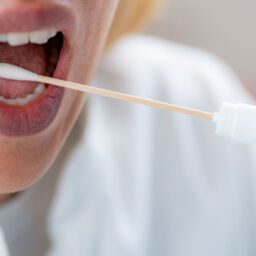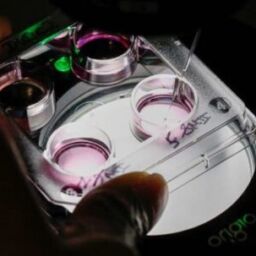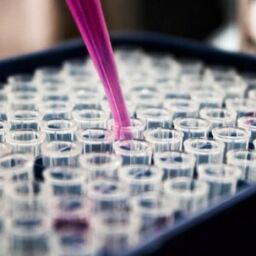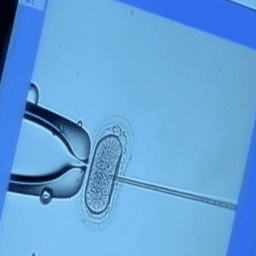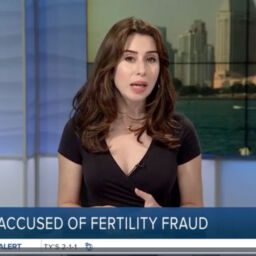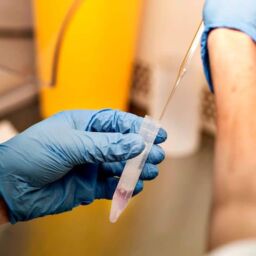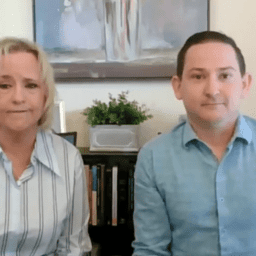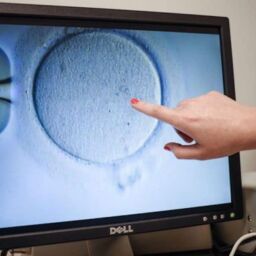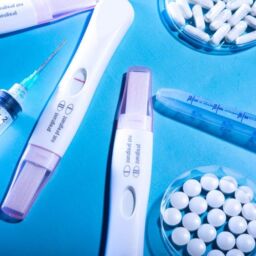“After a pregnancy complication eight years ago, Arianna Huhn sought genetic testing for herself and her parents. That’s when a family secret became untenable.
Heading off DNA test results, Huhn’s parents called her and revealed her biological origins. After difficulties conceiving, they told her, they’d turned to now-defunct Fifth Avenue Medical Group, which was also called San Diego Birth Center.
An obstetrician there sourced sperm, supposedly from an anonymous medical intern, and artificially inseminated Huhn’s mom.
But in 2017, Huhn spit into a tube and sent it to Ancestry.com, a consumer DNA testing service, and assembled a family tree. The truth emerged: Dr. Benjamin Fiorica, the fertility doctor, had used his own sperm.
“It’s still kind of jarring being the product of what feels like a medical assault,” said Huhn, who is 40 years old.
Huhn, who teaches anthropology at Cal State San Bernardino and directs the school’s anthropology museum, drew upon her background to process the startling discovery. “It’s just a very complex situation to ethically work through,” said Huhn.
When contacted by VOSD, Fiorica confirmed that he deceived Huhn’s mom and used his own sperm. He called the act a one-off. “I realize that I made a mistake,” said Fiorica, who lives in New York and said he’s retired.
Thanks to a proliferation in DNA testing, more people are figuring out they were “doctor conceived.” As their numbers grow, they’re joining forces to support one another and push for legislative changes, including legal rights to their medical histories.
Stoking public interest in the topic, HBO recently released “Baby God,” a documentary about the offspring of a Nevada physician who without permission injected women seeking artificial insemination with his own sperm rather than that of donors.
For Huhn, the revelation produced hefty questions: most puzzling, why the deception? Huhn said she asked Fiorica over lunch at a restaurant in 2017, their sole meeting, but never got an explanation. In an interview with VOSD, his motivation was similarly unclear.
“I really have no answer,” said Fiorica. “I can’t give you a good reason.”
Asked additional questions about his history, Fiorica said he didn’t implant his sperm in any of his other patients, nor did he donate sperm for other clinic doctors to implant in patients. Fiorica said he anonymously donated sperm years earlier during his medical residency training, in response to a call for healthy volunteers.
Huhn’s mom, Gail Fogelman, said she’s angry over Fiorica’s actions but she “doesn’t want to portray him as an evil demon.” She also doesn’t plan to sue him.
“If he would have done what he was supposed to do and used anonymous sperm, I might not have had Ari, who would have been a different person. And so I’m grateful for that,” she said. “But yet I still feel deceived.”
While a patient at Fifth Avenue Medical Group, Fogelman said Fiorica advised against ever disclosing her daughter’s origins to avoid pain and stress.
“Now looking at it, it feels manipulative, and that it was done at the doctor’s benefit and not for ours,” Fogelman said. “It’s very disappointing. We trust our doctors. I trusted him.”
Huhn was shaken upon piecing together Fiorica’s deceit, which he initially denied. In a 2017 email forwarded by Huhn, Fiorica apologized for the brush-off and then admitted he’s her biological father.
After they met for lunch, Huhn said she emailed Fiorica, but never got a response. She said re-establishing communication seems unlikely, while Fiorica said he “hasn’t ruled out” contacting Huhn.
Huhn said that like many who were donor-conceived, she wasn’t seeking a parent-child relationship. More than anything, it was a curiosity about sharing DNA with someone.
“There’s a genetic connection that can’t be denied,” she said. “Is my identity, or my life, or my wholeness dependent on it? No.”
Huhn said the father who raised her, who passed away several years ago, was an eternal optimist and her “No. 1 fan.” A musician and producer, he enlisted her as a backup singer in another musician’s concerts.
“I had a terrible voice, and continue to have a terrible voice, but he was just so blinded by me being his daughter, that he would support me and continue giving me these singing roles,” Huhn said with a laugh.
When her parents disclosed that she was donor-conceived, it was, in many ways, a relief, she said. The discovery helped explain guilt she felt. “I always felt a little bit guilty for not being more close to him and being more excited about his excitement,” Huhn said of the father who raised her.
The revelation also ended her confusion over not looking like anyone else in her family. Everyone, she said, deserves the right to know where they came from.
Huhn shared a family-friendly version of her roots with her 8-year-old son, and she’ll do the same for her younger daughter when the time comes. “I felt that it was important to normalize that for him as early as I could,” Huhn said.
The Push for Legislative Changes
State criminal law forbids the misuse of sperm and embryos in assisted reproduction. The statute doesn’t specifically call out physicians, nor is it retroactive to pregnancies before the law’s enactment in 1996.
Given numerous fertility fraud cases surfacing, there’s a strong case for updating criminal and civil law in California, said Dov Fox, a law professor at the University of San Diego and the author of “Birth Rights and Wrongs: How Medicine and Technology are Remaking Reproduction and the Law.”
Fox said that might include additional protections for victims, such as permitting lawsuits brought by those conceived through doctors’ unauthorized use of their own sperm.
Traci Portugal is pushing for such a change.
In 2019, Portugal took a DNA test for insight into her medical history. After she didn’t recognize names in her family tree, Portugal’s mom revealed that she tried fertility treatment.
Portugal said she learned from her mom that a doctor pledged to mix her dad’s sperm and that of an anonymous pre-med student. The DNA test results point to that same doctor being Portugal’s biological father.
In September, Portugal filed a complaint with the California Medical Board alleging that Dr. Gary Vandenberg used his own sperm, without her mom’s permission, as part of fertility treatment. Vandenberg operated a private clinic in San Diego but is now retired.
A medical board spokesman would not comment on the matter, citing confidentiality.
Michelle Trostler, a San Diego-based genetic genealogist who reviewed Portugal’s test results and lineage at VOSD’s request, said there’s “very little doubt” that Vandenberg is her biological father.
Trostler, who runs identifyfamily.com, noted Portugal’s 12.3 percent DNA match — a high percentage — with Vandenberg’s grandson, who also took a 23andMe test. Trostler also considered relationships in Portugal’s family tree and birthdates. Besides genetic information, Portugal provided a copy of her birth certificate, which lists Vandenberg as the attending physician at her birth.
After a letter to Vandenberg went unanswered, Portugal said she picked up the phone and got ahold of him at his practice. By Portugal’s telling, Vandenberg said the discoveries outlined in her letter sounded right, and he added “‘I donated a lot back then,’” Portugal said.
Portugal said she was horrified by his lack of compassion, combined with him providing little detail about her medical history. At a website she created, she wrote about the saga sending her into a deep depression.
“It felt like I tumbled into a black hole with no footholds and no knowledge on how to piece back together who I was, where I belonged, and how I fit into this world. I felt the dual grief of knowing my existence was based on 40+ years of lies and that my biological father was a man who abused his position as a trusted medical profession,” Portugal wrote.
Listed phone numbers for Vandenberg were disconnected. He did not respond to a mailed letter and one left at his Rancho Santa Fe home requesting comment on this article. A woman at the house said he was unavailable.
Before retiring, Vandenberg leased an office on the campus of Scripps Memorial Hospital La Jolla. The health system said Vandenberg operated a private, independent practice, and that the doctor doesn’t hold clinical privileges at any Scripps hospital.
“The health and safety of our patients is a top priority at Scripps. We are concerned to learn of these disturbing allegations, which involve claims of medical practices that Scripps does not — nor would ever – condone,” said Scripps spokesman Steve Carpowich in a statement.
Scripps said that it is in communication with Portugal, and that “no evidence has been provided to show any of the alleged incidents occurred in a Scripps Health hospital.”
Through the group Right to Know, Portugal is pushing for California legislation that would give those who were doctor-conceived standing to sue for fertility fraud, along with an extension in the statute of limitations. Portugal said her dad is deceased, and her mother has no interest in a lawsuit.
Right to Know also advocates for giving doctor-conceived individuals — and others under the banner of “misattributed parentage” — legal rights to their genetic and medical history. Such information can shape medical care, for instance.
‘When He Looks in the Mirror, He Sees the Person Who Violated His Mother’
In September, Beverly Willhelm filed a civil lawsuit alleging a San Diego physician that she consulted for fertility issues in 1988 used his own sperm for artificial insemination without her consent.
The lawsuit alleges that Phillip Milgram told Willhelm that the sperm was from a physician at UC San Diego who frequently donated sperm. Willhelm’s son discovered that Milgram is his biological father through a 23andMe test, states the complaint.
“To be clear, the child was seriously damaged by Milgram’s misconduct. When he looks in the mirror, he sees the person who violated his mother. But for now, we have sued only on behalf of Bev,” said in an email Wilhelm’s attorney, Adam Wolf, who is also representing women with similar allegations against other doctors.
Willhelm’s lawsuit, which alleges battery, intentional fraud and other grounds for legal action, seeks various damages, including economic ones. Another demand is that the doctor release his personal medical history.
Milgram, who runs a Carlsbad center for opiate addiction treatment, declined to comment.
When the lawsuit was filed, Milgram was also an attending physician at Scripps Memorial Hospital La Jolla. But Scripps Health said he no longer has clinical privileges there.
“As an independent physician with his own private practice, he previously had clinical privileges to provide care in the hospital when he needed to do so. This is a common scenario for many independent physicians,” said Carpowich in an email. The health system wasn’t named in the lawsuit.
“The health and safety of our patients is a top priority for Scripps Health. We at Scripps are disturbed by these allegations and are prepared to fully cooperate with any governmental investigation regarding allegations of this sort,” Carpowich said.
San Diego-based Illumina has fueled an explosion in genetic testing, including consumer services. The company’s DNA sequencing technology powers Ancestry.com and 23andMe.
Illumina in 2019 noted a slowdown in demand for consumer DNA test kits. But long term, the market is expected to chug along, meaning more people exploring their lineages — and more unearthing of family secrets.”
Voice of San Diego | Jared Whitlock | January 5, 2021
FREE CONSULTATION | 415-766-3545
Peiffer Wolf is nationally recognized for representing victims of fertility clinic misconduct and fertility doctor misconduct, including destruction or loss of eggs and embryos. If you or your family have been the victim of a reckless or negligent fertility clinic, fertility medical center, or fertility doctor, Contact Us by calling 415-766-3545 or by filling out an online Contact Form for a FREE Consultation.


